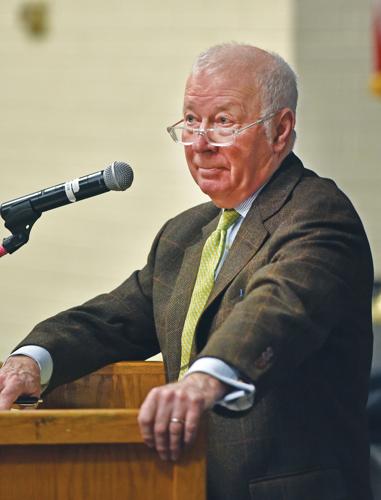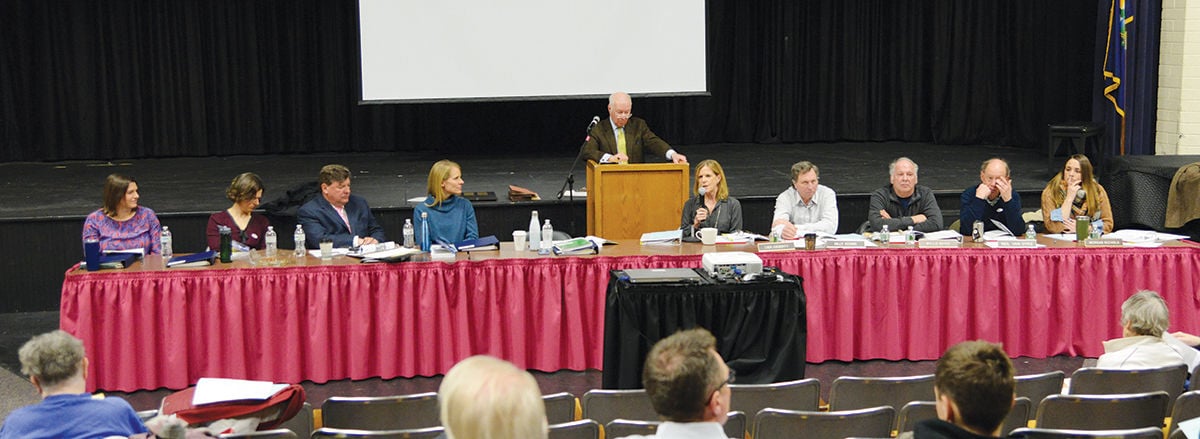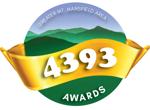Vermont’s town meeting moderators are the arbiters of democracy on that first Tuesday in March many Vermonters know so well.
Town Meeting Day is an annual tradition; any and all eligible voters in a town are encouraged to discuss and settle the community’s business via voice or paper vote, or by Australian ballot.
But as any moderator worth his or her salt could tell you, there’s no telling what direction a town meeting might take.
When residents get together to talk about what’s on their minds — and coming out of their pocketbooks — discussions can range from the frictional to the humorous to, quite frankly, the pretty personal.
Learning the rules
David Polow, an attorney in Hyde Park, was Morristown’s town moderator for 17 years. Polow, 65, said he didn’t ask for the role; it was thrust upon him. Last year was his final year as Morristown Town Meeting moderator; Shap Smith will likely take over.
“I didn’t want to run,” Polow said. “The select board asked me to do it.”
Polow moved to Vermont in 1972, and to Morristown in 1993. He and state Rep. David Yacovone were classmates in a class taught by Johnson State College professor Bill Doyle, whose passion for town meeting extended to an annual survey he’d assign students to fill out after they attended a meeting of their own.
Polow, a regular at town meeting, thought that, as a lawyer, being the moderator would come naturally.
Not so.
“Even though I’m a lawyer, I didn’t know anything about Robert’s Rules,” Polow said. “As a participant from the floor, your knowledge of Robert’s Rules can be pretty limited and you get by. Once I became moderator, I realized I have work to do to get up to speed.”
He took a class offered by the Vermont League of Cities and Towns and talked to other moderators to learn some tips and tricks.
“It’s your job as moderator to make sure you’re the expert, and you’re guiding the town residents and voters through the process and basically educate them through the process,” Hyde Park moderator Christine Hallquist said. “You have to be able to cite the actual Robert’s Rule. In the beginning, it’s a little hard because you’re flipping through your book,” but she figured it out, too.
Leighton Detora, a Stowe attorney, is in his 11th year as Stowe town meeting moderator. He was asked to moderate by Bill Kelk, who previously held the role.
When he first started, “I thought Robert’s Rules of Order was a pamphlet. It’s 700 pages. I was deathly afraid that there was somebody out there who’d memorized it who would want to play Stump the Moderator.”
That didn’t happen.
Hallquist learned quickly it’s OK to modify the rules, provided there’s unanimous consent.
She said when she knew a topic would spark heavy discussion, she’d ask voters at the beginning of the meeting to limit each person’s comments to two minutes, instead of the 10 allotted by Robert’s Rules.
“If you don’t do that in the beginning, you get yourself in trouble,” because then it looks like the moderator is trying to cut certain people off, Hallquist said.
“What people want to make sure is that, as a moderator, you’re not taking sides. By having a set of rules and following those rules and applying them evenly, you make sure you’re not taking sides,” she said.
Polow has faced the opposite problem — “trying to draw people out.”
“I really wanted many people to speak up. People are naturally shy. They don’t want to speak; they’re worried about what their neighbor said. Enough people weren’t talking, simply either because they didn’t understand they had the right to or they didn’t want to, (that) I really tried to encourage as much discussion as possible, before we held votes, particularly on a budget issue. You’re about to approve millions of dollars — are you sure you want to do this? You can ask the select board or Dan, our town manager, anything that you want,” Polow said.
Personal pushing and shoving
Heated discussions often pop up, typically around large appropriations.
“There are times when I actually asked people to calm down their rhetoric and people would get annoyed with me when I would follow the rules and ask them to state their name every time. People would get annoyed at that,” Polow said.
He remembers when one Morrisville resident brought in a non-local expert to try to persuade voters to invest town money in socially responsible businesses.
“I ruled it out of order, because it hadn’t been brought up appropriately,” Polow said, to the chagrin of the resident.
One Morrisville resident in particular often got other voters’ goats.
“A lot of people complained about him because he could sometimes be antagonistic. Sometimes, I’d call him out of order because he’d be chastising the select board as being this (group of) free-spending liberals giving away” town funds.
“We were having this inane debate, because it was his third time (speaking.) He ended up muttering under his breath and walking away,” Polow said.
Once in Stowe, when voters were debating whether or not to fund a new Zamboni “it was going back and forth and back and forth, and meanwhile, somebody had thought the meeting wouldn’t go until noon, so there wasn’t any food,” Detora recalled. “One great lady in town went out and bought a bunch of pizza.”
He said discussion went back and forth about dollars and need before one audience member said, “We bought that old Zamboni in 1989. How many of you people are driving a car out in that parking lot that was made in 1989?”
“The one-liners like that often do it,” Detora said.
In Hyde Park, “we had a debate about buying a new fire truck. There’s always somebody that says, ‘This one’s been running for 50 years. I don’t see why we need a new one,’” Hallquist said. “That’s usually where the debates start.”
Her favorite part of town meeting is the section at the end, “other business.”
“That’s one of the cute things about town meeting. There’s always somebody you wish happy birthday to, that somebody talks about in ‘other business.’ That’s where all the local things happen,” she said.
One year, Hallquist thought that, after four years of experience as town meeting moderator, she could get away with staying out a bit too late the night before.
“A friend of mine’s band was playing in Burlington, and they rented a bus, and they were picking people up, and I thought, ‘I’ve been moderator for four years, I can stay out late,’” Hallquist said with a rueful chuckle.
She ended up staying out until the clock struck 3 a.m., and, bleary-eyed, rolled into town meeting just a few short hours later.
“I kicked off the meeting and I was totally lost. I couldn’t even get through the Pledge (of Allegiance) and then I sat down. Luckily, the first order of business is a report from the town select board, so I was able to get out my notes and pull it together and came back up after the select board report and had it under control,” Hallquist said.
She explained the situation to the Hyde Park voters and got a ripple of laughter out of them.
Democratic haven
Hallquist, Polow and Detora all see the town moderator as a defender of pure democracy — decision-making by the people.
“It is a high-pressure job, because you don’t want to disappoint people,” Hallquist said.
One of the hardest things for her was keeping her opinion to herself.
“You have your opinions, but you recognize as town moderator that you can’t let those get in the way of running a balanced and good meeting,” she said.
“I’ve always had an interest in grassroots democracy, which is what town meeting is all about. It’s a great thing for Vermont to have this, whereas most parts of the country do not, particularly in this age of incredible partisanship,” Polow said.
“Once I started going, to me it, it was pure Americana, it was theater on some level, it was democracy on all levels, it was everything, and I just got hooked on it,” Detora said.
Hallquist and Polow note the decline in attendance at town meetings statewide.
“There’s been a sea change in Vermont’s culture. Nobody else had anything to do in the first Tuesday in March anyway, but now they do,” Polow said.
“People are so busy these days. They offer lunch, they offer snacks. We’ve talked about what we can do, but we haven’t really figured it out. Maybe we should have beer and a band,” Hallquist suggested.
She wrapped up her stint as moderator last year, and has some thoughts.
“If you run a good meeting, everybody loves you. Of course, when I was on the school board, you’re always taking positions and there’s always someone mad at you. If you’re taking positions on things, people are going to be mad at you. When you’re town moderator, you’re everybody’s friend. It’s a wonderful job,” she said.
“To me, it’s almost second nature,” Detora said. “I’ve always loved people. … I do worry that today our civil rights really are under attack, and I think that anything and everything that can be done to protect them should be done. One of those things is town meeting, which is really unique in America.”
Detora called the tradition “one of the best hedges against the loss of our rights.”


















(0) comments
Welcome to the discussion.
Log In
Keep it clean. Please avoid obscene, vulgar, lewd, racist or sexual language.
PLEASE TURN OFF YOUR CAPS LOCK.
Don't threaten. Threats of harming another person will not be tolerated.
Be truthful. Don't knowingly lie about anyone or anything.
Be nice. No racism, sexism or any sort of -ism that is degrading to another person.
Be proactive. Use the "Report" link on each comment to let us know of abusive posts.
Share with us. We'd love to hear eyewitness accounts, the history behind an article.